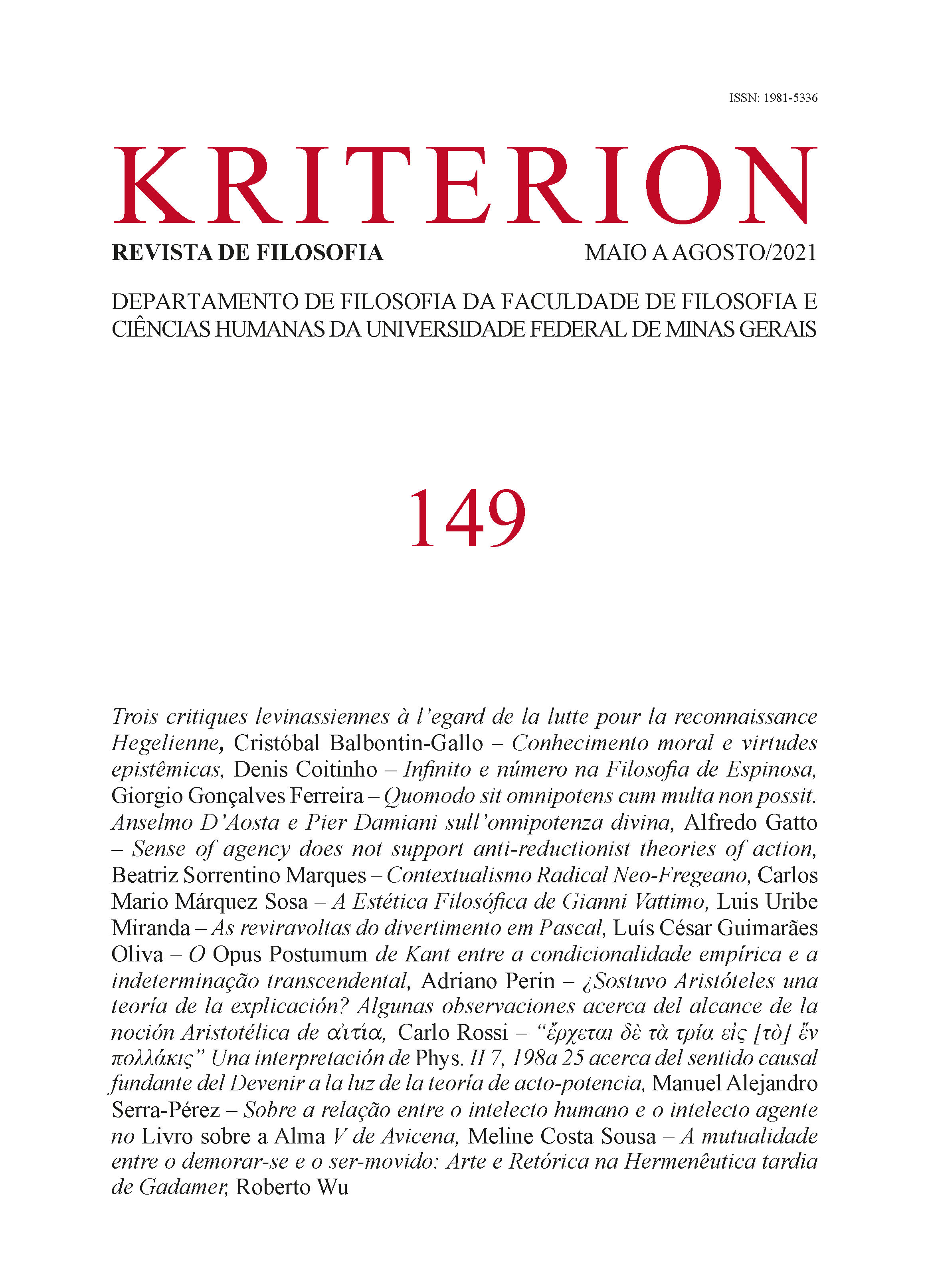SENSE OF AGENCY DOES NOT SUPPORT ANTI-REDUCTIONIST THEORIES OF ACTION
Keywords:
sense of agency, comparator model, action selection, control, reductionismAbstract
Anti-reductionist Theories of Action are, in general, accounts of action according to which the role the agent plays in the production of her action cannot be reduced to her mental events or states. Proponents of these theories present claims according to which Anti-reductionist Theories of Action better capture the sense of agency that agents experience when performing intentional actions than the competing Causal Theory of Action. I will investigate the arguments supporting these claims and argue that they do not survive scrutiny, especially when taking into consideration the neuro-cognitive information available about the sense of agency. Anti-reductionist Theories of Action seem incompatible with the empirical account of sense of agency, as show experiments focusing on action selection, the comparator model, and perception of the relation between action and its outcome. Alternatively, the Causal Theory of Action is more able to accommodate and explain the sense of agency.
Downloads
References
AGUILAR, J. “Basic Causal Deviance, Action Repertoires, and Reliability”. Philosophical Issues, 22(01), 2012, pp. 1-19.
BARLAS, Z., OBHI, S. “Freedom, Choice, and the Sense of Agency”. Frontiers in Human Neuroscience, 7(514), 2013, pp. 1-7.
BAYNE, T., LEVY, N. “The Feeling of Doing: Deconstructing the Phenomenology of Agency”. In: N. Sebanz, W. Prinz (ed.). Disorders of Volition. Cambridge, MA: MIT Press, 2006. pp. 49-68.
BECK, B., DI COSTA, S., HAGGARD, P. “Having Control Over The External World Increases The Implicit Sense of Agency”. Cognition, 162(201705), 2017, pp. 54-60.
BRATMAN, M. “Two Faces of Intention”. The Philosophical Review, 93(3), 1984, pp. 375-405.
CHAMBON, V., HAGGARD, P. “Sense of Control Depends on Fluency of Action Selection, Not Motor Performance”. Cognition, 125(3), 2012, pp. 441-451.
CHISHOLM, Roderick. “Human Freedom and the Self”. In: G. Watson (ed.). Free will. Oxford: Oxford University Press, 1964. pp. 24-35.
CLARKE, Randolph. “Agent Causation”. In: T. O’Connor, C. Sandis (eds.). A Companion to the Philosophy of Action. Oxford: Wiley-Blackwell, 2010. pp. 218-226.
DAVIDSON, D. “Actions, Reasons and Causes”. Journal of Philosophy, 60(23), 1963, pp. 685-700.
DEERY, O. “Why People Believe in Indeterminist Free Will”. Philosophical Studies, 172(8), 2014, pp. 2033-2054.
DEUTSCH, M. “The Myth of the Intuitive: Experimental Philosophy and Philosophical Method”. Oxford, MA: MIT Press, 2015.
ENÇ, B. “How We Act: Causes, Reasons and Intentions”. Oxford: Oxford University Press, 2003.
FEINBERG, I. “Efference Copy and Corollary Discharge: Implications for Thinking and Its Disorders”. Schizophrenia Bulletin, 4(4), 1978, pp. 636-640.
FRITH, C. “Explaining Delusions of Control: The Comparator Model 20 Years On”. Consciousness and Cognition, 21(1), 2012, pp. 52-54.
GALLAGHER, S. “Multiple Aspects in the Sense of Agency”. New Ideas in Psychology, 30(1), 2012, pp. 15-31.
GINET, C. “Freedom, Responsibility, and Agency”. The Journal of Ethics, 1(1), 1997, pp. 85-98.
GRÜNBAUM, T. “The Feeling of Agency Hypothesis: A Critique”. Synthese, 192(10), 2015, pp. 3313-3337.
HAGGARD, P. “Sense of Agency in the Human Brain”. Nature Reviews Neuroscience, 18(4), 2017, pp. 196-207.
HAGGARD, P., CLARK, S. “Intentional Action: Conscious Experience and Neural Prediction”. Consciousness and Cognition, 12(4), 2003, pp. 695-707.
HIERONYMI, P. “The Will as Reason”. Philosophical Perspectives, 23(1), 2009, pp. 201-220.
IMAIZUMI, S., TANNO, Y. “Intentional Binding Coincides with Explicit Sense of Agency”. Consciousness and Cognition, 67, 2019, pp. 1-15.
LIBET, B. “Unconscious Cerebral Initiative and the Role of Conscious Will in Voluntary Action”. Behavioral and Brain Sciences, 8(04), 1985 pp. 529.
LOWE, E. J. “Personal Agency: The Metaphysics of Mind and Action”. New York: Oxford University Press, 2008.
KNOBE, J., NICHOLS, S. “Experimental Philosophy”. Oxford, New York: Oxford University Press, 2008.
MELE, A. “Springs of Action: Understanding Intentional Behavior”. New York: Oxford University Press, 1992.
MOORE, J., HAGGARD, P. “Awareness of Action: Inference and Prediction”. Consciousness and Cognition, 17(1), 2008, pp. 136-144.
MYLOPOULOS, M. “Agentive Awareness Is Not Sensory Awareness”. Philosophical Studies, 172(3), 2015, pp. 761-780.
MYLOPOULOS, Myrto, SHEPHERD, Joshua. “Agentive Phenomenology”. In: U. Kriegel (ed.). Oxford Handbook of the Philosophy of Consciousness. Oxford: Oxford University Press, Forthcoming.
NIDA-RÜMELIN, M. “Doing and Subject Causation”. Erkenntnis, 67(2), 2007, pp. 255-272.
O’CONNOR, Timothy. “Agent Causation”. In: T. O’Connor (ed.). Agents, Causes, and Events: Essays on Indeterminism and Free Will. New York: Oxford University Press, 1995. pp. 173-200.
O’CONNOR, T. “Persons and Causes: The Metaphysics of Freewill”. New York: Oxford University Press, 2000.
O’CONNOR, T. “Agent Causal Power”. In: T. Handfield (ed.). Dispositions and Causes. Oxford: Oxford University Press, 2009. pp. 189-214.
PACHERIE, E. “The Phenomenology of Action: A Conceptual Framework”. Cognition, 107(1), 2008, pp. 179-217.
PEREBOOM, D. “The Phenomenology of Agency and Deterministic Agent Causation”. In: H. Pedersen, M. Altman (eds.). Horizons and Authenticity in Phenomenology, Existentialism, and Moral Psychology. New York: Springer, 2015. pp. 277-294.
SCHROETER, F. “Endorsement and Autonomous Agency”. Philosophy and Philosophical Research, 69(3), 2004, pp. 633-659.
SHEPHERD, J. “The Contours of Control”. Philosophical Studies, 170(3), 2014, pp. 395-411.
SMITH, B. “The Nature of Sensory Experience: The Case of Taste and Tasting”. Phenomenology and Mind Online Journal, 2013, pp. 292-313.
SYNOFZIK, M., VOSGERAU, G., NEWEN, A. “I Move, Therefore I Am: A New Theoretical Framework to Investigate Agency and Ownership”. Consciousness and Cognition, 17(2), 2008, pp. 411-424.
WEN, W., HAGGARD, P. “Prediction Error and Regularity Detection Underlie Two Dissociable Mechanisms for Computing the Sense of Agency”. Cognition, 195, 2020, pp. 104074.
WENKE, D., FLEMING, S., HAGGARD, P. “Subliminal Priming of Actions Influences Sense of Control Over Effects of Action”. Cognition, 115(1), 2010, pp. 26-38.
WOLPERT, D. M. “Computational Approaches to Motor Control”. Trends in Cognitive Sciences, 1(6), 1997, pp. 209-216.










